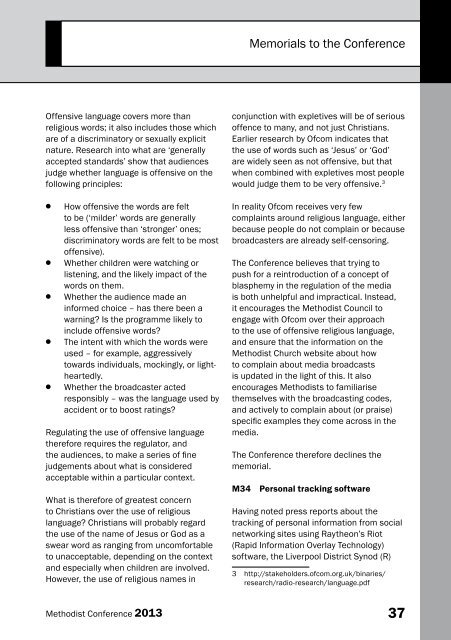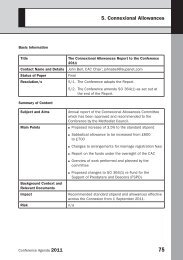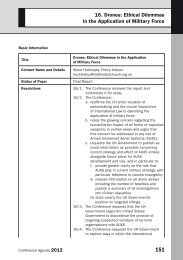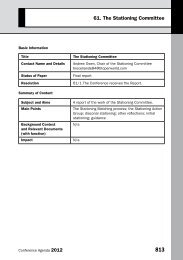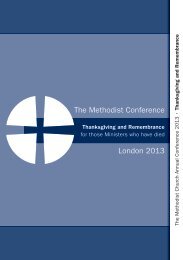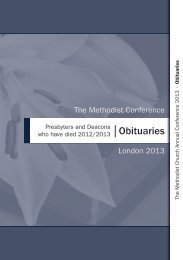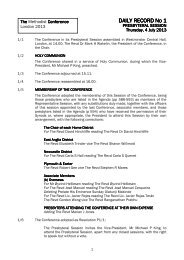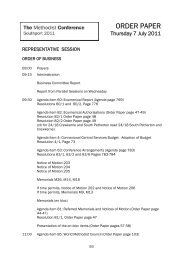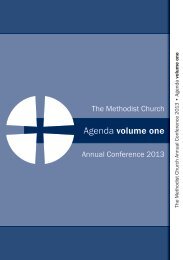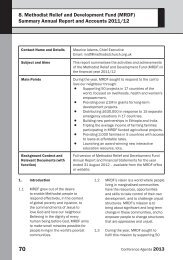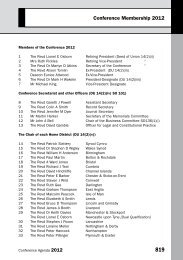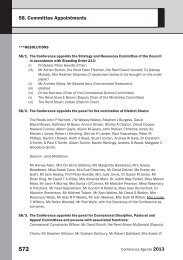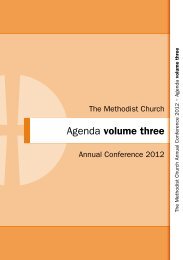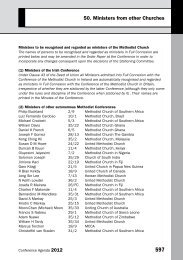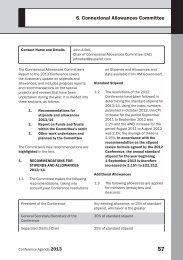Memorials to the Conference - Methodist Conference
Memorials to the Conference - Methodist Conference
Memorials to the Conference - Methodist Conference
You also want an ePaper? Increase the reach of your titles
YUMPU automatically turns print PDFs into web optimized ePapers that Google loves.
<strong>Memorials</strong> <strong>to</strong> <strong>the</strong> <strong>Conference</strong><br />
Offensive language covers more than<br />
religious words; it also includes those which<br />
are of a discrimina<strong>to</strong>ry or sexually explicit<br />
nature. Research in<strong>to</strong> what are ‘generally<br />
accepted standards’ show that audiences<br />
judge whe<strong>the</strong>r language is offensive on <strong>the</strong><br />
following principles:<br />
●●<br />
●●<br />
●●<br />
●●<br />
●●<br />
How offensive <strong>the</strong> words are felt<br />
<strong>to</strong> be (‘milder’ words are generally<br />
less offensive than ‘stronger’ ones;<br />
discrimina<strong>to</strong>ry words are felt <strong>to</strong> be most<br />
offensive).<br />
Whe<strong>the</strong>r children were watching or<br />
listening, and <strong>the</strong> likely impact of <strong>the</strong><br />
words on <strong>the</strong>m.<br />
Whe<strong>the</strong>r <strong>the</strong> audience made an<br />
informed choice – has <strong>the</strong>re been a<br />
warning? Is <strong>the</strong> programme likely <strong>to</strong><br />
include offensive words?<br />
The intent with which <strong>the</strong> words were<br />
used – for example, aggressively<br />
<strong>to</strong>wards individuals, mockingly, or ligh<strong>the</strong>artedly.<br />
Whe<strong>the</strong>r <strong>the</strong> broadcaster acted<br />
responsibly – was <strong>the</strong> language used by<br />
accident or <strong>to</strong> boost ratings?<br />
Regulating <strong>the</strong> use of offensive language<br />
<strong>the</strong>refore requires <strong>the</strong> regula<strong>to</strong>r, and<br />
<strong>the</strong> audiences, <strong>to</strong> make a series of fine<br />
judgements about what is considered<br />
acceptable within a particular context.<br />
What is <strong>the</strong>refore of greatest concern<br />
<strong>to</strong> Christians over <strong>the</strong> use of religious<br />
language? Christians will probably regard<br />
<strong>the</strong> use of <strong>the</strong> name of Jesus or God as a<br />
swear word as ranging from uncomfortable<br />
<strong>to</strong> unacceptable, depending on <strong>the</strong> context<br />
and especially when children are involved.<br />
However, <strong>the</strong> use of religious names in<br />
conjunction with expletives will be of serious<br />
offence <strong>to</strong> many, and not just Christians.<br />
Earlier research by Ofcom indicates that<br />
<strong>the</strong> use of words such as ‘Jesus’ or ‘God’<br />
are widely seen as not offensive, but that<br />
when combined with expletives most people<br />
would judge <strong>the</strong>m <strong>to</strong> be very offensive. 3<br />
In reality Ofcom receives very few<br />
complaints around religious language, ei<strong>the</strong>r<br />
because people do not complain or because<br />
broadcasters are already self-censoring.<br />
The <strong>Conference</strong> believes that trying <strong>to</strong><br />
push for a reintroduction of a concept of<br />
blasphemy in <strong>the</strong> regulation of <strong>the</strong> media<br />
is both unhelpful and impractical. Instead,<br />
it encourages <strong>the</strong> <strong>Methodist</strong> Council <strong>to</strong><br />
engage with Ofcom over <strong>the</strong>ir approach<br />
<strong>to</strong> <strong>the</strong> use of offensive religious language,<br />
and ensure that <strong>the</strong> information on <strong>the</strong><br />
<strong>Methodist</strong> Church website about how<br />
<strong>to</strong> complain about media broadcasts<br />
is updated in <strong>the</strong> light of this. It also<br />
encourages <strong>Methodist</strong>s <strong>to</strong> familiarise<br />
<strong>the</strong>mselves with <strong>the</strong> broadcasting codes,<br />
and actively <strong>to</strong> complain about (or praise)<br />
specific examples <strong>the</strong>y come across in <strong>the</strong><br />
media.<br />
The <strong>Conference</strong> <strong>the</strong>refore declines <strong>the</strong><br />
memorial.<br />
M34 Personal tracking software<br />
Having noted press reports about <strong>the</strong><br />
tracking of personal information from social<br />
networking sites using Ray<strong>the</strong>on’s Riot<br />
(Rapid Information Overlay Technology)<br />
software, <strong>the</strong> Liverpool District Synod (R)<br />
3 http://stakeholders.ofcom.org.uk/binaries/<br />
research/radio-research/language.pdf<br />
<strong>Methodist</strong> <strong>Conference</strong> 2013<br />
37


